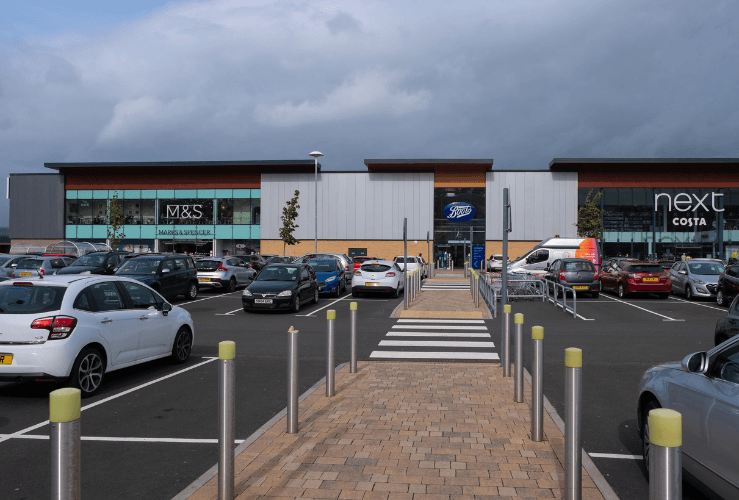The rules governing retail car parks differ slightly from council-run car parks.
In this article we’ll examine some of the differences and specific issues to be aware of.
However, note that rules may well differ between different car parks.
What is a retail car park?
As the name suggests, retail car parks are parking zones created for shoppers of specific stores.
Technically, a retail car park may be of any size, but is nearly always privately owned and operated.
 Credit: James - stock.adobe.com
Credit: James - stock.adobe.com
Car park rules
In private car parks (just as with those run by council), a list of rules must be displayed on a sign or placard, clarifying what the terms of use are.
Make sure you read these.
Do I need a parking ticket?
Many retail car parks are free to use. This is because the retail outlets want to attract as many shoppers as possible. Additionally, retail car parks are often located in ‘out-of-town’ locations, so the free car parking is unlikely to be misused - e.g. people won’t use the car park for reasons other than visiting the associated retail outlets.
However, retail car parks located in urban areas may charge parking fees, or limit free parking, to prevent people using the car parks for reasons other than shopping at the associated retail outlets.
In urban locations, you may be required to obtain a parking ticket from a nearby machine - whether it is free or not - and then display it on your vehicle.
Just as with a paid ticket, with free tickets, the date and time is marked on the ticket - so parking attendants know if you’ve exceeded the maximum allowed stay.
In other locations, ANPR systems may be used to keep track of you (see below).
Maximum allowed stay at retail car parks?
Out-of-town retail car parks may offer free car parking all day.
The Bluewater shopping centre in Kent is an example of free parking. They do this because there is no other reason why someone would park at Bluewater aside from shopping there, and parking charges would dissuade shoppers from visiting.
However, even when parking is theoretically free, a car parked for more than 24 hours is likely to attract the attention of the parking attendants and police.
Conversely, an urban shopping centre like the Arndale in Manchester does charge for parking. If parking was free, people would simply use it to park for all kinds of reasons - not just visiting the Arndale.
Additionally, urban car parks generate significant revenue.
Retail car parks with free parking may limit how long you can park for. This is usually between one and three hours.
This may be enforced by Automatic Number Plate Recognition (ANPR) systems, which read your numberplate and can determine if you’ve overstayed; or through the issue of free parking tickets which must be displayed in the window of your vehicle.
Parking fines: how do they know my address?
It can be rather disconcerting to receive a parking fine in the post from a private parking firm - how did they find your address?
The private owners of retail car parks can request a driver's address via the DVLA if they are a member of the British Parking Association (BPA) or the Independent Parking Committee (IPC).
Parking too early
Some retail outlet car parks may not allow parking before a certain time on certain days - for instance Sundays before 10am.
Ensure you understand the terms of use before leaving the car park.
Using a disabled space without displaying a Blue Badge
To use a disabled parking space you must have a ‘Blue Badge’ and ensure it is clearly visible.
Gov.uk states: "Blue Badges help people with disabilities or health conditions park closer to their destination".
 Credit: pxl.store - stock.adobe.com
Credit: pxl.store - stock.adobe.com
Not meeting the minimum spend
Some retail car parks may offer free parking provided you meet a minimum spend. See ‘validate parking’ below.
https://stock.adobe.com/images/ikea-store-tottenham-the-facade-and-car-park-to-the-north-london-branch-of-the-popular-swedish-furniture-retailer-near-edmonton/298040781
Child/parent parking spaces
Some retail car parks offer spaces specifically for people with children. The maximum age of the youngest child is usually 12 - and of course, the child must be present.
A parking fine may be issued if the rules are not met.
Are retail parking fines enforceable?
Are you required to pay retail car park fines?
It depends on the circumstances.
Retail car parks are often by private firms which issue 'Parking Charge Notices' if they decide a rule has been broken.
These should not be confused with council-issued ‘Penalty Charge Notices’, which aside from having the same abbreviation are also chequered black and yellow.
While they look similar, from a legal standpoint they are rather different.
Generally, if you’re issued a Penalty Charge Notice by a council/police it should be paid, while Parking Charge Notices are "an invitation to pay".
You can appeal against a Parking Charge Notice if you feel it has been unfairly levied - for example if the ticket machine was broken, or the rules were not clearly displayed.
If possible, back up any appeal with photos, receipts and witness statements.
It’s not advisable to ignore a Parking Charge Notice, since the issuing company may take you to court over it.
If your appeal is not successful you may well lose the right to pay at the reduced rate - e.g. an £80 fine may be reduced to £40 if paid within 14 days.
‘Validate parking’ - what does it mean?
A parking ticket is considered "validated" and therefore free (or provided at reduced cost) once a minimum purchase has been made at the retail outlets.
This prevents people from using the car park for other reasons.
Why do some retail car parks have height restrictions?
High-sided vehicles can cause congestion in car parks of all types. For this reason, such vehicles may be restricted by a barrier with a horizontal bar at the maximum height.
Do retail car parks need a licence?
No, retail car parks are private in the UK and are unregulated.
That said, the rules of use must be clearly displayed.
Are retail car parks considered private land?
Retail car parks are built on private land, whether owned by the retail outlets or a private car park firm. They are not council/state owned, nor considered part of the public highway.




